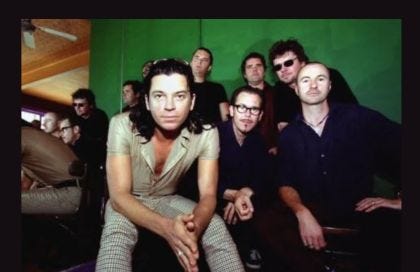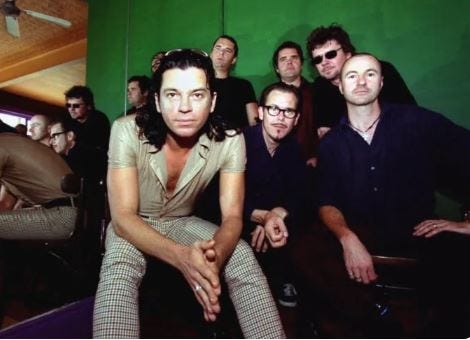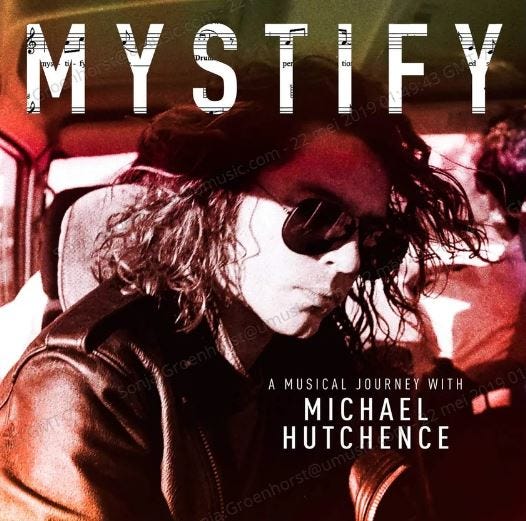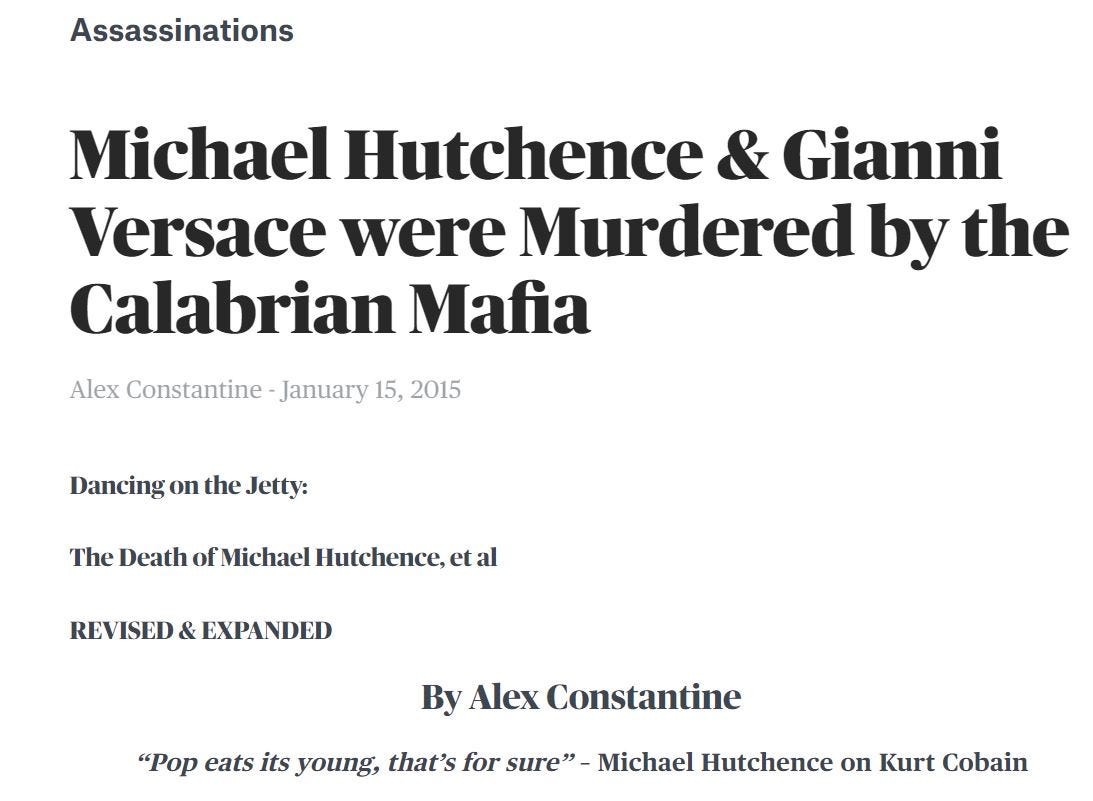Michael Hutchence - Who Knew?
“His body bore the marks of a severe beating (a broken hand, a split lip, lacerations.)" Rolling Stone. Yet Australian police found “no evidence” of foul play.
(Photo Credit: x1039radio)
There was no formal inquest. Friends of Hutchence told investigators that the “happy/depressed” rock singer was “involved in kinky sex over the years,” and though it’s fairly certain that he was not the first rock musician (or typical human being, for that matter) to indulge in “kinky sex,” the coroner cast doubt on auto-eroticism as the cause of death. But the salacious indictment appeared in Rupert Murdoch’s New York Post, took on a life of its own, gathered momentum on the newswires, sprinted across the airwaves and barreled through the world media machine into the minds of the perception managed.
Alex Constantine - Constantine Report - January 15, 2015
Media propaganda machines and Michael Hutchence
Lately I have been reminded of a story my mother told me about the information blackout in Estonia that accompanied the brutal arrival of iron fisted Soviet-style communism that forced its ugly way into their lives following the notorious 1939 Molotov-Ribbentrop Pact and illegal annexation.
“We were lucky to to have Finland as our neighbour” said my mother, Maja. “Our window to the west. That’s how found out what was going on in the world.” She was just a teenager at the time.
Ironically, Estonia broke free from the Soviet iron fist in 1989-1990 while Australia quietly began to succumb to an eerily similar, uninvited, tightening grip. Ever so secretly. The puppet Australian government turned mafia corporation's primary weapon of silent war, was and is, an infantile, controlled mass media which has been reduced to an obedient, dreary, lockstep propaganda machine. But thankfully, the internet allows us to stay as informed as we wish to be via reliable, objective, independent media sources. And we are not going to turn into a full blown, genocidal Soviet Russia or Nazi Germany - Part 2.
So what does a propaganda media machine have to do with the death of INXS vocalist Michael Hutchence, aged 37, on November 22, 1997? Everything.
Untimely deaths of too many talented, loved souls
I had little to no interest in media reports about Michael Hutchence or INXS prior to his death but really liked some of their music. Manufactured, mass media ‘star frenzies’ tend to have the opposite effect on me, probably because I worked in the media industry and knew how the superficial game was played. I had a similar experience with the Princess Diana ‘show’. And a few others.
Talented, charismatic people who become public figures, commonly morph into heavily handled, money-spinning showbiz products until they fall out of line or break the rules and become a potential problem. Untimely deaths seem to be a common unavoidable denominator.
When I first heard the terrible news about Michael’s death in November 1997, which was hastily rumoured to be suicide by autoerotic asphyxiation, I was really upset and intuitively felt that something was amiss. Then I had two lucid dreams about Michael. He appeared radiant and full of life in both of them. And I bought my first INXS album. Elegantly Wasted. Their tenth studio album released on 15 April 1997.
I travelled to Sydney to visit family and friends in November 1998. My randomly chosen dates happened to coincide with the first anniversary of Michael’s death. I drove to Double Bay and wandered past the Ritz-Carlton hotel, thinking about his devastated family and INXS band members. And what really happened in Room 524 on the last day of Michael’s earthly walk; his poetry, musical artistry, love and compassion. I also visited the Northern Suburbs Memorial Gardens to see Michael’s memorial and paid my respects from a distance as his family and friends arrived for a memorial service held in the nearby chapel.
Life went on. More media reports came and went. Various documentaries emerged over time. But questions remained.
Chris M. Murphy takes up the story: “Over four weeks, Mark and I would work through late, spooky nights together dealing with Michael’s past work while turning it into new work, a new body of work.
There were plenty of tears of remembrance along with tears of joy as we were doing something Michael would love. Late one night, Mark called me from the studio yelling: ‘Mate, there are ghosts everywhere flying around the room”.
He described: ‘Every time I could not decide if Michael would like the direction of a track he would get down on his knees to pray to Michael and God and they would always answer him.’
Mystify: A Musical Journey With Michael Hutchence - Released June 2019
Coroner’s Report
The NSW coroner’s report about Michael’s death was finalised on February 6, 1998 but not released to the public until November 2017:
“I am satisfied that the cause of death was ‘hanging’. I am also satisfied that there was no other person involved in causing the death.”
“…I am also satisfied that this death is one in which nothing will be gained by holding a formal Inquest. The identity of the deceased, the date and place of death and the manner and cause of death are clearly set out and the time and expense of holding an Inquest is not warranted and therefore such will be dispensed with.”
Read the full coroner’s report via A Journal of Musical Things: 20 Years Later, We Finally Get to See the Coroner’s Report on the Death of Michael Hutchence by Alan Cross
Mafia Research
I often refer to Australia as Murdoch’s murky media fishbowl, made even murkier by the likes of George Soros who bought a stake in the Nine Network, now Nine Entertainment – my former playground in the 80s and early 90s. The pre hijack-sanitisation era.
These days, I write and edit articles/books for the sheer love of it, tinker with playwriting and also enjoy playing with video editing - a literal world away from the clunky old world of editing ratings winning tv promos on tape machines.
My current project is a series of short videos about Australia’s largely untold, highbrow, dirty-as, mafia history. Wealthy villains who invaded our shores from the late 1960s, aided and abetted by many prominent Australian public figures, including the one and only Rupert Murdoch. Who will eventually be permanently replaced by his chosen, heavily groomed son, Lachlan. Will he follow in his father's grubby shoes? Only time will tell.
I have named my series: Society of Faeries Sparkle Files: DIY Steal the World - Global Mob Style. Primarily based on an eye-popping document called How Australia was Bought and Sold which crossed my path in 2021, and clearly penned by a mischievous, unnamed insider. The secrets, lies, rip-offs, murders and corruption are surefire blockbuster movie material.
(Credit: Hollywood Life)
Additional Mafiosi research about Rupert Murdoch unexpectedly led me to Michael Hutchence. My Brave browser initially produced a slew of articles about Rupert & Co's disgraceful phone hacking scandal. A blaring July 12, 2011 Daily Mail headline claimed the hack involved 3,870 names, 5,000 landline numbers and 4,000 mobiles.
Sydney Morning Herald, Nov 11, 2011 - MP claims Murdoch is like a 'mafia boss' – Tim Dick
Labour MP Tom Watson:
"Mr Murdoch, you must be the first mafia boss in history who did not know he was running a criminal enterprise." Having already said the line of questioning was offensive, Mr Murdoch told the chairman the comment was inappropriate.
Then, the biggest headline of them all, caught my attention
Constantine Report
Check it out: https://constantinereport.com/evidence-considered-indisputable-michael-hutchence-gianni-versace-murdered-calabrian-mafia/
Alex Constantine’s comprehensive report filled in a few chasms about mafia interferences in Michael’s life and career, and exposed Rupert Murdoch’s ‘mafia press’ in all its perception driven murkiness. It also dawned on me how little I actually knew about the case.
To be honest, I wondered where I’d been. But then I remembered. Australia. The heavily sanitised and propagandised Murdoch/Soros etc fishbowl. A carbon copy of my mother’s media blackout experience in communist infested Estonia. Even Michael’s heartbroken family couldn’t get the full story out there via the infantile Australian media – from my perspective, anyway.
Key points of interest in Alex Constantine’s 2015 report:
Detectives Mark Smith and Michael Gerondis described the scene inside Hutchence’s room when his body was found. They told reporters that on one hand they found “a months-old cigarette burn so deep it exposed the bone. The cigarette went right through his fingers and it was sort of infected.”
No “months-old cigarette burn” turns up in photos taken shortly before Hutchence’s death. Again, Rolling Stone reported that one hand was broken when his body was found.
The detectives also said they found “the bath filled with water, as if Hutchence had been preparing to have a soak before he hanged himself with a belt.” The “suicide” verdict, based largely on statements made by Bob Geldof to police concerning an argument over the custody of Tiger Lilly, was the theory favored by the coroner. Is it plausible that Hutchence intended to “have a soak” before choking himself to death?
The apparent rational explanation, based on all available evidence, is that he was bathing when interrupted by intruders. The tub was filled and the tap turned off. As mentioned, police were unable to explain precisely why Hutchence was found naked. The bath explains it. He was dragged from the tub, strangled, injured in the struggle. He fought and broke his hand. His killers punched or kicked him in the face, lacerating his lip. The rope used to strangle him was left tied to the door so the murder could be dismissed as suicide. This is why he didn’t leave a note.
The motive for homicide is self-evident: his wealth had been hijacked by Diamond and his colleagues, the Romeo family and their CIA partners. Hutchence was suicided before he could discover the slick accounting tricks that left him a pauper.
The will had been altered, as Patricia Glassop noted, to conceal evidence of financial chicanery, perhaps a flat statement that members of the family were ultimate beneficiaries of the trusts set up by Colin Diamond, a fact that would turn up in the second set of books that the barrister without a license likely kept to show Hutchence, destroyed once he was dead.
Michael’s heroin-addicted girlfriend raises another hanging question – the roles that she and Geldof played in his death. They have both provided explanations, a false dialectic: Paula fed the Murdochian sexual asphyxiation allegations, Geldof the Tiger Lilly-custody-dispute-suicide narrative.
Martha Troupe, his manager, spoke with him by phone at 1:00 am on the morning he died: “He was in a brilliant mood when I spoke to him. He was talking about film things, and he’d read a script. Just the second I got on the phone he was ‘Martha I love you,’ just lovable, lovable, lovable. And he was very excited that day from rehearsal and he felt it was really going well. He was happy.”
Kym Wilson, a friend of the vocalist, spent some five hours with him. She was the last person to see him alive and reported: “He was concerned about the custody hearing but I wouldn't say he was depressed. His attitude was that he believed he was right and that he and Paula should get custody of the children and if they didn't have luck this time, they would keep fighting on. I never for one instant think he thought that would be the end.” Hutchence had spoken “with such excitement of his future -- I had really never seen him with so much to look forward to.”
The devil lurks in the details, so before rushing this case file to the “Day the Music Died” morgue, one last check in the flotsam of circumstances related to a very peculiar death is in order.
On December 24, police spokesmen announced that they were anxious to quash this ugly rumor. An argumentative skeptic might ask why this particular bit of speculation was reported in the first place. E! News Online: “Authorities have not officially ruled Hutchence's case a suicide, although that's where they’ve indicated they’re leaning, in spite of tabloid reports that the 37-year old singer accidentally hung himself while practicing an oxygen-deprivation masturbation game.”
Two weeks after his death, INXS members called a press conference to complain about a cover story on their late lead vocalist entitled “Auto-Eroticism -- the Sex that Kills” in New Weekly magazine. (New Weekly is owned by the Bauer Media Group, a publishing house that glorifies the Hitler regime.) The article played on the conjecture that Hutchence did not commit suicide but strangled himself accidentally. The stills, lewd S&M bondage scenes, were shot by fashion photographer Helmut Newton two weeks prior. The magazine’s cover featured a photo of Hutchence chained, a ravishing tart barely clad in leather arching over him. Another portrayed the tart wearing a saddle, with Hutchence the domineering equestrian.
The Murdoch newspaper chain reveled in the salacious bondage allegations, enraging Tina Hutchence, his half-sister, who posted a scathing OpEd to the world on the Internet excoriating the CEO of the News International Corp.
Tina Hutchence didn’t know it, but this smear was one smoking gun among many.
Another explanation for Hutchence’s death was not so readily obvious and open to conjecture, but emerged when his family laid claim to his estate. The Murdoch empire’s saturation reporting was a cover story to divert attention from certain connections to the “disappearance” of some $30-million of his funds, as will be seen.
It wasn’t the first time this strategy was employed by Murdoch.
In the ‘70s, his newspapers had steered public attention away from CIA, American military and Australian police ties to the collapsed Nugan Hand Bank, a front for the laundering of drug proceeds, established and operated with an assist from Peter Abeles, Murdoch’s business partner. Legal counsel for the bank was CIA Director William Colby. Directors of the bank hailed largely from the US intelligence establishment and Pentagon.
In 2009, Swans Commentary examined “the tight relationship between the mainstream media and the criminal underworld” in Australia, and found it was no anomaly “leading NSW [New South Wales] crime reporters” published equally scurrilous stories “breathlessly splashed across the ... front pages of Rupert Murdoch’s now defunct Sydney paper The Daily Mirror. Thus while under normal circumstances one might expect that structural factors alone are enough to ensure that the mainstream media manufactures consent for elite interests,” Murdoch’s reporters “facilitated this process by covering up for the key movers in Australia’s organized crime scene.”
The “key movers” worked for the US government.
The same Australian Mafia families that supplied the CIA with cocaine, marijuana and other drugs for global distribution stole every cent that Michael Hutchence earned as a performer. Murdoch had an ancillary role in the drug and money laundering activity as perception manager who covered for the “elite interests” of the CIA and corrupt Australian authorities in the ‘70s, a role that he would repeat by concealing the true circumstances surrounding the death of Michael Hutchence 20 years later with sordid sexual diversions.
All considered, it was a damned peculiar death. Senior Constable Mark Hargreaves of the NSW Police media unit, asked by reporters why Hutchence was naked when he hung himself, replied: “It was early in the morning, he could have just gotten out of bed. It's hard to determine if he did it on purpose or by accident.”
He didn't leave a suicide note behind.
The night before his body was found, Hutchence had dinner with his father and stepmother at a local Indian restaurant. They laughed throughout the meal. His father expressed concern about Michael’s personal problems, but was reassured, “Dad, I'm fine.”
The INXS vocalist “was an unlikely candidate for suicide,” noted Glenn Baker, an Australian pop music historian. “He was the consummate rock star. He took on the role of a star so comfortably. He floated above the pressures. Why he would choose this moment to throw in the towel I think will always remain a mystery.”
Ian “Molly” Meldrum, a television celebrity in Australia and close friend, said he last saw the singer in Los Angeles eight weeks before. Meldrum told reporters: “He seemed so happy and at peace, and even said to me, ‘I’ve never been happier in my life.’”
Zinta Reindel and Tamara Brachmanis, guests at the Ritz during Hutchence's last stay there, talked to him the night before his “suicide,” and recalled, “He looked like he was a bit high on something … but he was happy.” Why not? He was branching out into a thespian career in a Quentin Tarantino production and working on a solo album.
His daughter was to be christened soon. Why abandon her without so much as a note?
Significant details were filtered from most press accounts. Corporate news outlets reported: “SYDNEY, Australia -- Michael Hutchence, the lead singer for the rock band INXS, was found dead Saturday in a Sydney hotel … shortly after midday. The INXS frontman was in Australia preparing for the band’s 20th anniversary tour. His body was discovered by a maid when she went to make-up the room. Prescription pills were found scattered over the floor of his suite and there were bottles of alcohol on a sideboard.”
Pills, mostly antibiotics, Prozac, booze and a hotel room in a state of squalor -- a death scene consistent with suicide. Hutchence died of asphyxiation. His body was still warm when he was found kneeling, tied to a door, the leather belt looped around his neck. He choked to death – by his own hand or another’s?
Music critic David Fricke, writing in Rolling Stone, supplemented the standard metro daily obit: “His body bore the marks of a severe beating (a broken hand, a split lip, lacerations).
Yet Australian police found “no evidence” of foul play. Derek Hand, the new South Wales coroner, stated without reservation: “The standard required to conclude that his death was a suicide has been reached.”
But the coroner’s report did not address obvious discrepancies. Did Hutchence break his own hand? Did he bludgeon himself until his lip bled, then beat himself into a pulp, and by doing so break bones in his hand? Then how, with one good hand and the other in excruciating, throbbing pain, did he manage to loop the belt through the door brace and around his neck securely enough to hang? The coroner didn't address the lingering questions, but was so confident of his verdict that he advised against an investigation: “Nothing will be gained by holding a formal inquest,” he concluded.
A homicide probe would consume unwarranted “time and expense.” Case clos . . .
But, please, one more small peek at the record. The suicide verdict may have been self-evident to a trained medical examiner like Hand, but it wasn't universally accepted. Paula Yates appeared on Australian television in March, 1998 to declare publicly that she sought legal advice to contest the finding. She said that Hutchence considered suicide the most cowardly act in the world. “I will be making it abundantly clear that because of information that I and only I could know about, I cannot accept the verdict. And I won't have my child grow up thinking that her father left her, not knowing the way he loved her.” She acknowledged that Hutchence may have been depressed, but Hutchence’s infant daughter was his passion, his “reason to live.” “In no way do I accept the coroner's verdict of suicide.”
But Australian police clung to it for reasons that had nothing to do with his baby daughter or even his legendary libido, and everything to do with the Australian drug trade and certain local Mafia clans with ties to the CIA.
The Sydney Morning Herald reported on March 8, 1998 that Hutchence “died almost penniless.”
Much has been made of auto-erotic asphyxiation as the cause of death, but the “missing millions” and drug ties offer another explanation, one that did not echo internationally through the Murdoch press.
Devils Outside
"I turn over a lot of money for a lot of people and I’m the smallest fish in it." – Michael Hutchence
In my biased opinion, musicians and all dedicated artists deserve way more care, respect and responsibly managed payola.
I’m off to listen to INXS. Until next time.








